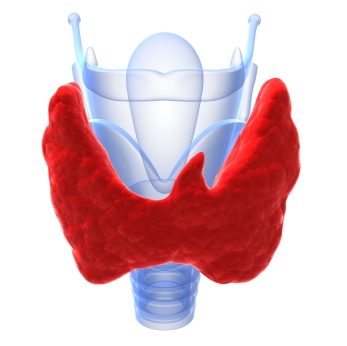Hashimoto’s Thyroiditis: When Your Immune System Attacks Your Thyroid
 Imagine you are a soldier in battle. You and your troops are advancing at breakneck speed toward enemy lines. Suddenly, your fellow soldiers commit the absolute betrayal: they turn their guns upon you. Now imagine that your own body turns against you – this is basically what happens with Autoimmune Thyroiditis.
Imagine you are a soldier in battle. You and your troops are advancing at breakneck speed toward enemy lines. Suddenly, your fellow soldiers commit the absolute betrayal: they turn their guns upon you. Now imagine that your own body turns against you – this is basically what happens with Autoimmune Thyroiditis.
What is Hashimoto’s Thyroiditis?
A similar scenario occurs with Hashimoto’s thyroiditis, also known as autoimmune thyroiditis. It is an autoimmune disorder. Dr. Hakaru Hashimoto was the first to publish information about the disease in 1912, thus the name. In Hashimoto’s thyroiditis, the immune system begins making antibodies against its own thyroid gland, effectively launching an attack of friendly fire. These antibodies then bind to the thyroid gland and thyroid hormone in the cells, thus preventing the production and utilization of thyroid hormone and degrading the thyroid gland itself.
Causes or Triggers of Hashimoto’s
- The incidence of Hashimoto’s thyroiditis increases with age and is more prevalent among women.
- Hashimoto’s can often worsen or trigger after childbirth.
- In our practice, we have also found that there is a relationship between Hashimoto’s thyroiditis and allergic disorders.
- There is a relationship between gluten sensitivity and autoimmune thyroiditis, because sensitivity to gluten can cause the immune system to make antibodies against the thyroid gland, as occurs with Hashimoto’s.
- Adrenal fatigue can also be a factor in developing Hashimoto’s. There is a genetic predisposition toward Hashimoto’s thyroiditis, as well.
Symptoms of Hashimoto’s Thyroiditis
Hashimoto’s essentially makes one hypothyroid, thus the symptoms of Hashimoto’s are the symptoms of hypothyroidism:
- fatigue
- cold extremities
- dry skin
- hair loss
- weight gain
- brain fog
- short term memory loss
- joint aches and pains
- tired after a full night’s sleep
- recurrent and chronic infections
- low body temperature
- elevated cholesterol
- depression
- constipation
Testing for Hashimoto’s Thyroiditis
In addition to looking at your symptoms, the best way to test for Hashimoto’s thyroiditis is testing the blood for the thyroid antibodies. This can be done by having your blood checked for two thyroid antibodies:
1. Thyroid peroxidase antibodies (TPOAB) and
2. Antithyroglobulin antibodies (ATA)
The antibodies attack these important pieces of the thyroid assembly line, effectively dampening thyroid production and utilization.
Some Hashimoto’s patients experience a symptomatic swing from the symptoms of low thyroid to the symptoms of an overactive thyroid. As the thyroid gland is damaged by the thyroid antibodies, thyroid hormone is released into the bloodstream resulting in a manifestation of the symptoms of hyperthyroidism. As this thyroid hormone dissipates, the individual with Hashimoto’s yet again experiences symptoms of hypothyroidism.
Treatment of Hashimoto’s
How do we treat Hashimoto’s thyroiditis? Hashimoto’s can be treated with compounded T3/T4 thyroid preparations, resulting in effectively eliminating the symptoms of low thyroid once you have reached the optimal thyroid dosage. On the other hand, synthetic thyroid medications such as Synthroid only contain T4, which is the inactive thyroid hormone. Your body must convert T4 to T3, the active form of thyroid hormone, in order for it to be utilized within the cells.
For those that have a problem converting T4 to T3, also known as type 2 hypothyroidism, this can effectively render your thyroid medication useless. Compounded T3/T4, as well as desiccated thyroid preparations such as Armour Thyroid and NatureThroid, contain both the inactive and active forms of thyroid, T4 and T3.
Dr. Hotze reveals what you can do for Hashimoto’s:
We Can Help
Do you have symptoms of Hashimoto’s? Are you not getting the results you need on your thyroid medication? We can help. We have had great results in treating our guests with Hashimoto’s.
Contact our Wellness Consultants at 281-698-8698 for a complimentary wellness consultation today. It would be our privilege to serve you.
Related Content
Gluten-Free Webinar
Why Your Doc Misses the Hypothyroidism Diagnosis
Stressed out? Tired? You Might Have Adrenal Fatigue.

Linda Renee Park-Day
What else can I take or do to help my body absorb my bio identical hormone being given to me via the Hotze Health & Wellness Center? Is there anything else that could be added to my regular regimen of hormones & vitamins? I have also been diagnosed with adrenal fatigue which I am taking a small dose of Cortisol hormone every morning. My fatigue is so pervasive. My blood level antibody scores were over 146+, and I have been on the Hotze treatment now for 28 days. I just wanted to know if there is something that could be ADD ED to my current tx plan to increase the absorption of the Thyroid hormone? Please respond. Thank you.
Hotze Team
Dear Linda,
Because Federal law mandates all medical information must be shared only within a private and secure forum, we are unable to respond specifically to your questions. However, we have informed our Nursing Department of your concerns and they will be contacting you shortly. Please remember that you can contact our Phone Nurse Department by calling 281-579-3600 with any questions or concerns. You can also submit questions through your Patient Portal if that is more convenient. We want you to know that we are here for you during this journey and wish to support you any way we can.
Sincerely,
Hotze Team